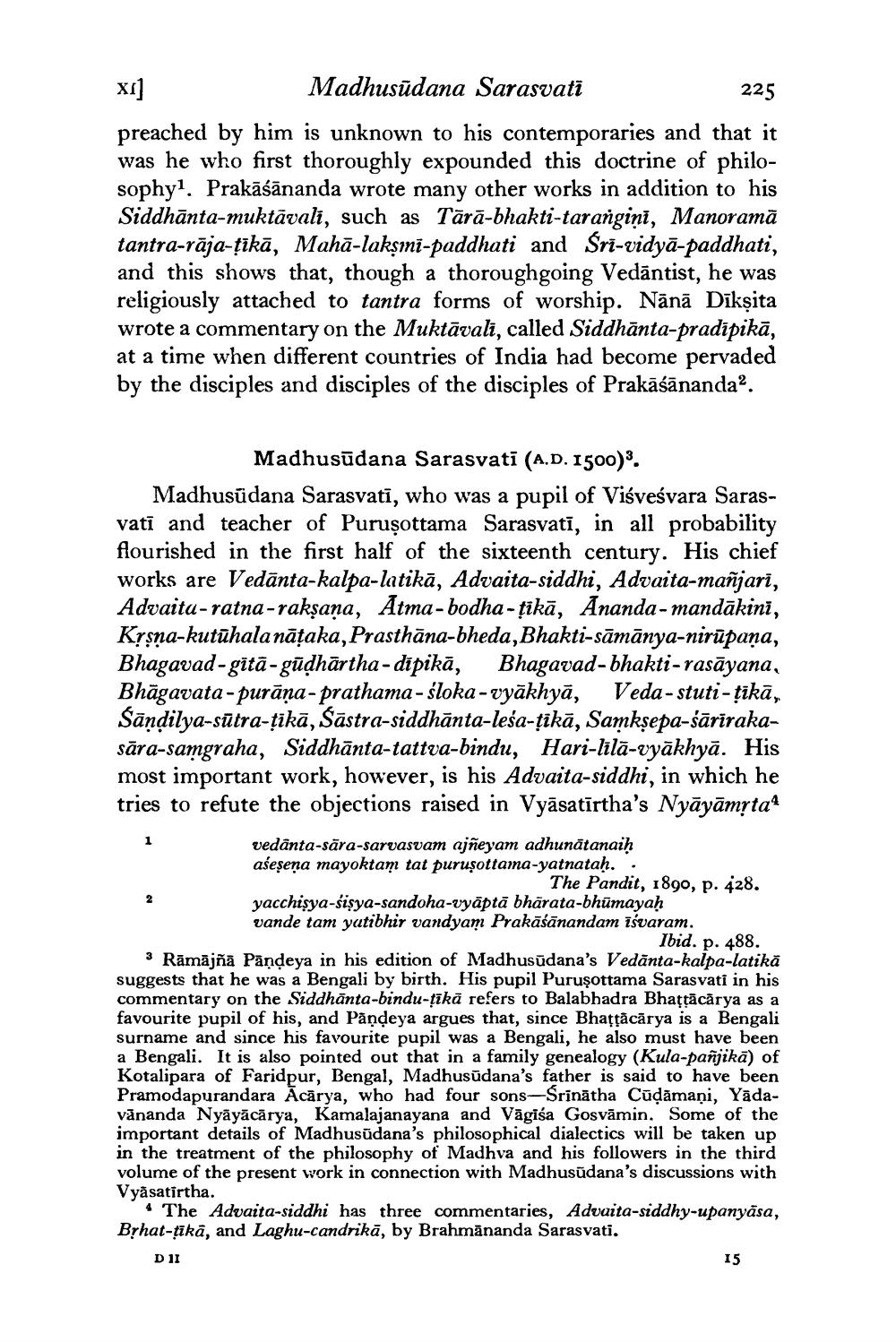________________
xi] Madhusūdana Sarasvati
225 preached by him is unknown to his contemporaries and that it was he who first thoroughly expounded this doctrine of philosophy?. Prakāśānanda wrote many other works in addition to his Siddhānta-muktāvali, such as Tārā-bhakti-tarangini, Manoramā tantra-rāja-țīkā, Mahā-lakşıni-paddhati and Śrī-vidyā-paddhati, and this shows that, though a thoroughgoing Vedāntist, he was religiously attached to tantra forms of worship. Nānā Dīksita wrote a commentary on the Muktāvali, called Siddhānta-pradīpikā, at a time when different countries of India had become pervaded by the disciples and disciples of the disciples of Prakāśānanda?.
Madhusūdana Sarasvati (A.D. 1500) Madhusudana Sarasvatī, who was a pupil of Viśveśvara Sarasvati and teacher of Puruşottama Sarasvatī, in all probability flourished in the first half of the sixteenth century. His chief works are Vedānta-kalpa-latikā, Advaita-siddhi, Advaita-mañjari, Advaita-ratna-rakṣaṇa, Atma-bodha-ţikā, Ananda-mandākini, Kļşņa-kutūhala nāțaka, Prasthāna-bheda,Bhakti-sāmānya-nirūpaña, Bhagavad-gitā-gūdhārtha-dipikā, Bhagavad-bhakti-rasāyana, Bhāgavata - purāņa-prathama - śloka - vyākhyā, Veda-stuti - tikā, Sāņdilya-sūtra-țīkā, Šāstra-siddhānta-leśa-țīkā, Samkṣepa-śārīrakasāra-samgraha, Siddhānta-tattva-bindu, Hari-lilā-vyākhyā. His most important work, however, is his Advaita-siddhi, in which he tries to refute the objections raised in Vyāsatīrtha's Nyāyām;ta*
vedānta-sära-sarvasvam ajñeyam adhunätanaih aśeșena mayoktam tat puruşottama-yatnatah..
The Pandit, 1890, p. 428. yacchişya-sisya-sandoha-vyāptā bhārata-bhūmayah vande tam yatibhir vandyam Prakāśānandam īśvaram.
Ibid. p. 488. 3 Rāmājñā Pandeya in his edition of Madhusūdana's Vedānta-kalpa-latikā suggests that he was a Bengali by birth. His pupil Puruşottama Sarasvati in his commentary on the Siddhānta-bindu-țīkā refers to Balabhadra Bhattācārya as a favourite pupil of his, and Pandeya argues that, since Bhattācārya is a Bengali surname and since his favourite pupil was a Bengali, he also must have been a Bengali. It is also pointed out that in a family genealogy (Kula-pañjikā) of Kotalipara of Faridpur, Bengal, Madhusūdana's father is said to have been Pramodapurandara Acārya, who had four sons-Srinātha Cūdāmaņi, Yādavānanda Nyāyācārya, Kamalajanayana and Vāgisa Gosvāmin. Some of the important details of Madhusūdana's philosophical dialectics will be taken up in the treatment of the philosophy of Madhva and his followers in the third volume of the present work in connection with Madhusūdana's discussions with Vyåsatirtha.
4 The Advaita-siddhi has three commentaries, Advaita-siddhy-upanyasa, Brhat-tīkā, and Laghu-candrikā, by Brahmananda Sarasvati.
DII




